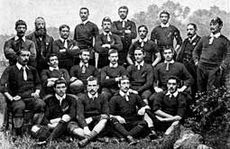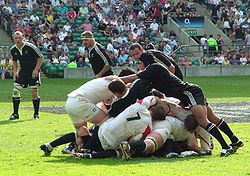- New Zealand Māori rugby union team
-
New Zealand Māori 
Union New Zealand Rugby Union Coach(es)  Jamie Joseph
Jamie JosephCaptain(s) Liam Messam Team kitChange kitFirst international  Ireland 4 – 13 New Zealand Māori (as the New Zealand Natives)
Ireland 4 – 13 New Zealand Māori (as the New Zealand Natives) 
(1 December 1888)Largest win  United States 6 – 74 New Zealand Māori
United States 6 – 74 New Zealand Māori 
(7 June 2006)Largest defeat  New Zealand Māori 6 – 31 Australia
New Zealand Māori 6 – 31 Australia 
(23 September 1936)New Zealand Māori is a rugby union team that traditionally plays teams touring New Zealand. A prerequisite for playing in this team is that the player is to have Māori whakapapa or genealogy. In the past this rule was not strictly applied. In the past non-Māori players who looked Māori were often selected in the team.[citation needed] These included a few Island players and a couple of African descent. Today all players have their ancestry verified before selection in the team and there is a 1/16 maori blood requirement[citation needed] Although the rugby union team does not compete in the World Cup, it competed in the Churchill Cup, which it won in 2004 and 2006.
Contents
History
In 1888–89, the 'New Zealand Natives' were the first overseas team to tour the Home Nations. At first the team was meant to comprise only Māori, but four "whites" were finally included to strengthen the combination. Before leaving New Zealand the team played nine matches for seven wins and two losses; and two matches (one won, one drawn) at Melbourne on the way to Europe. Once in the UK, they played three or four times a week for a total of 74 games for 49 wins, five drawn games, and 20 losses. Ireland were beaten (13–4) in Dublin, but Wales won (5–0) in Swansea, and England won (7–0) at Blackheath. They won 14 games on their return to Australia and seven of the eight played in New Zealand.One of the New Zealand Natives' greatest legacies was the haka, a traditional Māori posture dance with vigorous movements and stamping of the feet, to the accompaniment of rhythmically shouted words; this was first performed during a match on 3 October against Surrey. The haka was later adopted by the New Zealand national team, the All Blacks, as were their black shirts (previous New Zealand sides had worn navy blue).
Since being given official status in 1910, the New Zealand Māori have produced some of world rugby union's most outstanding athletes, including fullback George Nepia who played 46 games for the All Blacks from 1924–30, halfback Sid Going who played 86 matches for his country and former All Blacks captain Tane Norton, who represented New Zealand in 61 games, including 27 tests, and later became President of the New Zealand Rugby Union.
The 1926–27 touring side, captained by Walter Barclay MM, is considered the best ever Māori team. In a seven-month tour which took place in Australia, Ceylon, France, Wales and Canada, the side played 38 matches, winning 29, losing seven and drawing two. Full-back George Nepia was left at home after missing the boat from Wellington.
In 2001, the Māori first performed the "Timatanga" haka, which describes the evolution of life and the creation of New Zealand from the four winds.
The team lost only four of its 26 games played between 1994 and 2004, including beating England, Argentina, Scotland and Fiji. The Māori continued their winning form in 2004 beating England A (now known as England Saxons) in extra time in the final of the Churchill Cup in Canada.
In 2005 the Māori beat the British and Irish Lions for the first time in an official match. Their preparations for this match forced them to withdraw from the 2005 Churchill Cup. They returned to that competition in 2006, defeating Ireland A and the USA in pool play in Santa Clara, California and Scotland A in the final in Edmonton, Alberta.
Matt Te Pou is the longest serving New Zealand Maori coach.
Pacific Nations Cup
Main article: Pacific Nations CupThe Pacific Nations Cup is an international rugby union competition held between six Pacific rim sides; Fiji, Japan, Western Samoa, Tonga, Australia A and New Zealand Māori. The Junior All Blacks (New Zealand's second XVs, not an underage team) used to compete in it.
New Zealand Maori also replaced the Junior All Blacks in the 2008 Cup, where they were undefeated champions, narrowly beating Australia A in the final game of the tournament. The team did not compete in the 2008 Churchill Cup.
Centenary Series
In 2010 to celebrate the Centenary of New Zealand's Maori Rugby team, a special commemorative stamp has been issued by New Zealand Post to pay tribute to the players, coaches, administrators and supporters who have taken New Zealand Maori rugby through the decades, overcoming challenges to emerge stronger and more relevant than ever.[1]
Games
NZ Maori 37 vs New Zealand Barbarians 31
NZ Maori 31 vs Ireland 28
NZ Maori 35 vs England 28
Current squad
2010 New Zealand Māori squad for the Centenary series:
Backs Player Position Club Aaron Smith Scrum-half Manawatu Chris Smylie Scrum-half North Harbour Ruki Tipuna Scrum-half Wellington Stephen Brett Fly-half Canterbury Willie Ripia Fly-half Taranaki Luke McAlister Centre North Harbour Dwayne Sweeney Centre Waikato Jackson Willison Centre Waikato Hosea Gear Wing Wellington Sean Maitland Wing Canterbury Robbie Robinson Fullback Southland Andre Taylor Fullback Manawatu Forwards Player Position Club Dane Coles Hooker Wellington Corey Flynn Hooker Canterbury Ben Afeaki Prop North Harbour Jacob Ellison Prop Wellington Bronson Murray Prop Northland Clint Newland Prop Hawke's Bay/ Leinster Romana Graham Lock Waikato Daniel Ramsay Lock Wellington Isaac Ross Lock Canterbury Hayden Triggs Lock Otago Jarrad Hoeata Flanker Taranaki Tanerau Latimer Flanker Bay of Plenty Karl Lowe Flanker Hawke's Bay Colin Bourke Number eight Bay of Plenty Liam Messam (c) Number eight Waikato Notable former players
- Walter Barclay MM
- Christian Cullen
- Eric Rush
- Mathew Berquist
- Zinzan Brooke
- Ron Cribb
- Rhys Duggan
- Troy Flavell
- Rico Gear
- Carl Hayman
- Gavin Hill
- Marty Holah
- Glen Jackson
- Angus MacDonald
- Leon MacDonald
- Luke McAlister
- Deon Muir
- Matua Parkinson
- Steve Pokere
- Caleb Ralph
- Taine Randell
- Roger Randle
- Hika Reid
- Bruce Reihana
- Carlos Spencer
- Rua Tipoki
- Willie Walker
- Ryan Nicholas
- James Arlidge
- Piri Weepu
- Norm Hewitt
- Ruki Tipuna
- Adrian Cashmore
- Kevin Boroevich
- Norm Berryman
- Greg Feek
- John Mcdonell
- Daniel Braid
- Hoani Macdonald
- Sean Hohneck
- Deacon Manu
- Scott Linklater
- Wayne Ormond
- Craig McGrath
- Neil Brew
- Riki Flutey
- Ben Couch
- Jason Kawau
See also
- 1888-1889 New Zealand Native football team
- All Blacks
- Junior All Blacks
- New Zealand Māori rugby league team
- New Zealand Māori cricket team
References
- ^ 100 Years of NZ Maori Rugby team World Stamp News, 8 June 2010
External links
- Uncovering the Maori mystery BBC Sport, 5 June 2003
- Rugby Union Football – History An Encyclopaedia of New Zealand 1966
- Against the Odds – Matt Te Pou and Maori Rugby (book) Huia Publishers
Rugby union in New Zealand Governing body National teams New Zealand • Junior All Blacks • New Zealand Māori • 7's • U-21 • U-19 • U-20 • Schoolboys • Women'sCompetitions Super Rugby • ITM Cup • Heartland Championship (Meads Cup • Lochore Cup) • Ranfurly Shield • Hanan Shield • Pub Charity Sevens • Women's NPCRelated articles International playersThe Churchill Cup Permanent Teams Invited Teams, 2011 Former Teams Season nd}}
Categories:- New Zealand Māori rugby union team
- International rugby union teams
- New Zealand national rugby union team
Wikimedia Foundation. 2010.


